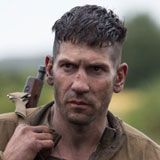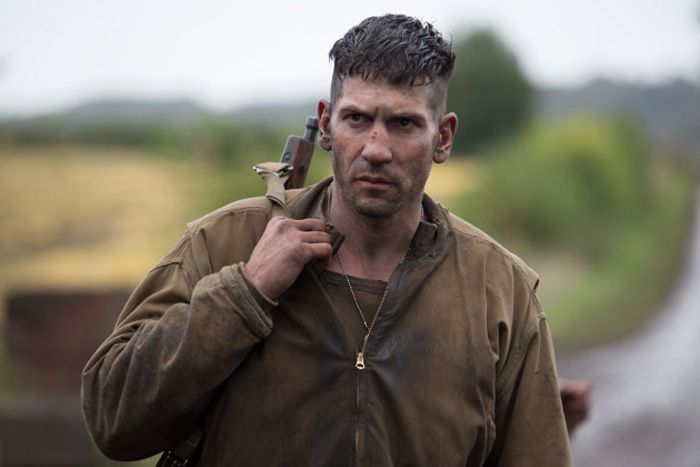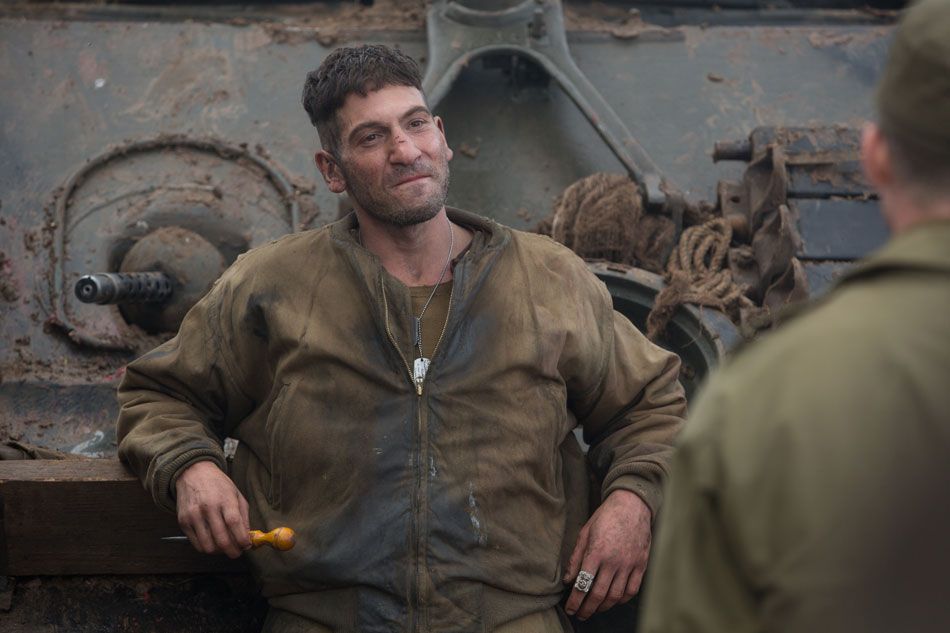If you thought Jon Bernthal was badass taking on zombies, just wait until you see him go up against Nazis.
In Fury, the new World War II thriller from filmmaker David Ayer, the actor moves from the bleak horror realm of The Walking Dead to an even more intense, and all-too-real, landscape: the Allied incursion into Nazi Germany. As part of the closely bonded Sherman tank team led by Brad Pitt’s Wardaddy, Bernthal tackles one of his most challenging roles yet, playing the loyal shell loader Grady, whose backwoods demeanor can shift rapidly from charming to menacing.
Talking with SPINOFF, Bernthal reveals how he followed the trail of breadcrumbs in filmmaker Ayer’s screenplay to create a character distinctly different from himself, the ways he bonded with his on-screen tank crew, and what his experience on The Walking Dead mean to him.
Spinoff Online: One of the things that I thought was so interesting was that the five of you are in so much of the movie together as a group. That’s such a unique thing. I’m curious how was that for you as an actor to share that much time together with the four other performers?
Jon Bernthal: That’s really what this whole thing was about, from the beginning. I remember the first time we met a Sherman tank was in Santa Barbara, about five months before we started shooting. We all were asked to drive up to Santa Barbara. We all kind of met on the tank. We got in the tank for the first time, and the thing we were told is that, “You know, these things, they’re death machines – they’re meant to kill everything around it.” But the thing that don’t tell you, and that any tanker will tell you, is that they’re also meant to kill anything inside of it. If your leg or your arm is in the wrong place, it can get snapped off by the turret when it rotates like that [snaps his fingers]. The hatches are 75 pounds; you can lose an arm. All tankers say in basic tank training, “Guys get run over. Guys lose limbs.” Stuff happens all the time. There are incredibly dangerous sharp edges. There’s nothing sort of comfortable about it.
I remember we met each other in that world, and it’s so tight in there, it’s so cramped. There’s not a single one of us who didn’t look at each other – the most gung ho of us – and said, “How the fuck are we going to survive five-six months in this place? It’s so tight.” What’s crazy is that by the time we started rolling – I think again, this is a part of David Ayer’s genius – by the time we started shooting, there was nobody on Earth I’d rather be with and no place I’d rather be than inside that tank with those guys. It was the most comfortable place on Earth. We needed every nook and cranny of it. We could operate every bit. Everything in there, we put in there. It was our tank, it didn’t belong to anybody else. We were completely proficient at firing it, putting it together, taking it apart, loading it, driving it, knew all the weapons on it, knew all the tools on it, knew where everything was. We had done any kind of tank drill known to man, we had done it. At no point did we feel like – I mean, it was crazy. It was a two-month pre-production of just training, training, training and fighting. And not four-hour rehearsals, but I’m talking about 14-, 15-hour days, every day, two months out. You know, no cameras – just us getting to know each other, pushing each other, fighting each other, learning about each other, training with each other. Again, everything I’ve heard from tankers, both modern and from the past, they just say that with a tank crew, it’s so intimate. All the hierarchy of rank goes out the window. It’s just about the rules and the family that you guys sort of create with each other. For better or for worse, you know how each other smell. You know what your pee looks like. You know what your poop smells like. You know who eats what, and how they eat. You just know each other so freaking well, for better and for worse. To me, this is a family drama, about a family rotting in a metal box through hell.
You clearly made a transformation into your character Grady. There’s a whole different physical look you adopt for him. There’s a whole different manner from any other performance I’ve seen you give. Tell me about finding him and the specifics of who this guy is.
Finding Grady: Well, first of all, vocally one of the big things for me was the accent. In the script, as you can gather from listening to David Ayer talk, David doesn’t make mistakes: There’s nothing that’s going to be in a David Ayer script that was a typo or an accident. One thing I noticed is, one time in the script, he was referred to by another soldier as being from Alabama. And then another time in the script, he was referred to by another soldier being from Arkansas. And I thought, “Hmm, was this a typo? Was this a spell-check error?” But then I started thinking about it, and I said, “Well, look, it’s soldiers from the North – they’re soldiers from the Midwest generalizing soldiers from the South, and just being like, ‘They’re from Alabama. They’re from Arkansas.’” So what that gave me was liberty to make Grady be from wherever the hell I wanted him to be. So what I did was I found a certain man with a certain voice from the north Georgia hills and Appalachia, and I learned his voice. I had a great vocal coach named Jessica Drake, and I made Grady from a very, very specific place. I had pictures of the place. The dialect was the root.
Related: Michael Pena Finds His Way in "Fury" Before a Secretive Stint in "Ant-Man"
And then you dug into who he was from there.
These guys were all product of the Depression. There’s no mass communication, no ability to sort of get outside the little mountain hollow that he lived in. All of a sudden now, he’s at war. He’s crossed the ocean. He’s in Africa. He’s in France. He’s in Germany. He’s driving around in a tank driven by a Mexican guy from Chicago who listens to jazz music, and his world’s totally been opened up. As far as the physicality, there’s something about a loader. It’s really the lifeblood of the tank, because any soldier I’ve talked to with real combat experience talks about the release of the kill. They talk about you’ve lost brothers, you’ve seen people die left and right of you, and you go through it, and you’re war-torn and you’re beat up emotionally. But there’s a release to actually see an enemy combatant, pull the trigger and take his life – see that person die in front of you. And there’s some sort of release. It’s like punching an enemy.
Grady doesn’t get that. Grady doesn’t fire weapons. Grady doesn’t shoot people. All he does is works to pound these shells into this cannon, as fast and as rapidly as he can, to listen to [Wardaddy’s] command. He doesn’t see anything, he doesn’t hear anything outside of the tank, he just needs to work to pump. He is that heart: pumping, pumping, pumping. So for me, a lot of times people say the loader is the strongest guy, the biggest guy, but you know, there’s this constant motion – I would basically, every single day, load at least 300 shells as fast as I could, and I had blood dripping down my hands every day. They would try to get me to wear these protective gloves. I would never do it. I’m not saying this to make you think I’m some kind of tough guy, but I really wanted to get physically this thing, this kind of hunched-over, longed-armed, motion all the time. The effect that that would have on the back, and that affects the walk. The way that he would yell, “Clear!” That’s basically what he does; he says one word – “Clear!” – and it needs to be heard by everybody. You’ll notice everybody in the movie is on comms. Grady very rarely is on comms. I don’t need to hear anything except for War Daddy that’s right there. Anything else is a distraction. Another thing with Grady is, the loader does have a periscope. I made a decision pretty early on that Grady made a decision he no longer wants to look outside of the periscope. All I know is, “I gotta listen to my command, get that shell and that breach.”
The Walking Dead was clearly a big turning point in your career. Do you miss it? And what did you learn from that experience that you continue to apply as you go to work?
You know, I don’t miss it. I miss the people: Norman Reedus, Andy Lincoln, Sarah Wayne Callies, Jeff DeMunn, Scott Wilson, Frank Darabont. These are some of the most important artists in my life, and I’m enormously grateful to all of these people, and we’re still very, very close. I’m still a huge supporter and fan of the show. I love that time. It was for me, I felt like, the first role I got – I’d done some stuff before that. I’d been around a little bit, but I had never gotten a shot to – as far as I’m concerned – really dive into a character with a real arc, that really tapped into a lot of the things that are important to me as a man and as an artist, that I felt like Shane was about. You know, questions of loyalty and questions of love, and questions of doing what’s right against all odds. And I think a lot of people looked at that character as a villain, and I really didn’t. It was an enormously wonderful opportunity for me. But I also feel like dying on that show was an enormously wonderful opportunity for me, because I feel like I got to be a part of that show at a time when it was very humble. It came from very humble beginnings. Nobody thought in a million years it was going to be that, so there was a very blue-collar, very hard-nosed, hard-lined work ethic that was at the heart of that show. Very much like in Fury, as well. Any outside distractions were completely looked down upon. Any sort of effort to make yourself pretty on that show or to try to do something cool, to do something to wink at the audience, were fiercely looked down upon by us. And a culture was formed by that original group of actors that I know really they try to institute even still. And I think Andrew Lincoln is one of the best leaders of a set I’ve ever seen. And he’s very good at that – you know it all comes down from the top. And I think in the beginning of the show, you just had a bunch of people that were gung ho as crazy who believed in it like crazy. So as far as really committed work and jobs that are all-encompassing, yeah, I think I learned that on that show.
I’ve always been that kind of stage actor, but I love to be able to do that on film. And Walking Dead, like Fury, was very much an ensemble piece. If you’ve got a group of people walking through the woods, and potentially there are zombies about, if one person isn’t constantly scanning the woods, all of a sudden it’s a joke. The same is true with Fury. If one person isn’t in it 100 percent or backs off or is on a cell phone or thinking about what they’re going to do when they wrap that night. This was not a movie where people go out for Chinese food afterward. This was not a movie where we went to the bars afterwards. You stayed in the world. I love working like that. I think you’re just, you’re one kind of artist or you’re the other. You’re either the kind of guy who lives for those kinds of things, or you’re the kind of guy who does this thing to go to the bar. I think with David, he demands that you’re that kind of actor, and he only hires people that will want to work in those kinds of conditions. I hope that answers it. I miss the people, but I’m so happy and grateful to be where I am right now.
Fury opens Friday nationwide.



